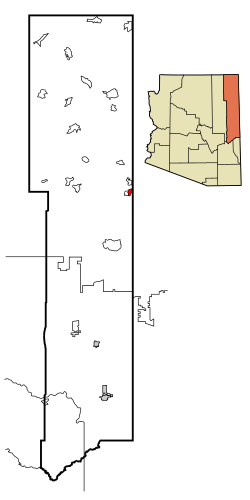Window Rock, Arizona
|
Window Rock Tségháhoodzání |
|
|---|---|
| City | |

|
|
 Location in Apache County and the state of Arizona |
|
| Coordinates: 35°40′22″N 109°3′44″W / 35.67278°N 109.06222°WCoordinates: 35°40′22″N 109°3′44″W / 35.67278°N 109.06222°W | |
| Country | United States |
| State | Arizona |
| County | Apache |
| Indian Reservation | Navajo Nation |
| Navajo Nation | Tsʼíhootso Navajo Chapter |
| Government | |
| • Type | St. Michaels Chapter Government |
| • Chapter President | Curran Hannon |
| Area | |
| • City | 5.3 sq mi (13.7 km2) |
| • Land | 5.3 sq mi (13.7 km2) |
| • Water | 0.0 sq mi (0.0 km2) |
| Elevation | 6,830 ft (2,082 m) |
| Population (2010) | |
| • City | 2,712 |
| • Density | 514/sq mi (198.4/km2) |
| • Metro | 6,336 |
| Time zone | MST (UTC-7) |
| • Summer (DST) | MDT (UTC-6) |
| ZIP code | 86515 |
| Area code | 928 |
| FIPS code | 04-83720 |
| GNIS feature ID | 0013908 |
Window Rock (Navajo: Tségháhoodzání) is a small city that serves as the seat of government and capital of the Navajo Nation, the largest territory of a sovereign Native American nation in North America. It lies within the boundaries of the St. Michaels Chapter, adjacent to the Arizona and New Mexico state line. Window Rock hosts the Navajo Nation governmental campus which contains the Navajo Nation Council, Navajo Nation Supreme Court, the offices of the Navajo Nation President and Vice President, and many Navajo government buildings.
Window Rock's population was 2,712 at the 2010 census., but is estimated to reach around 20,000 during weekdays when tribal offices are open. Window Rock's main attraction is the window formation of sandstone the community is named after. The Navajo Nation Museum, the Navajo Nation Zoological and Botanical Park, and the Navajo Nation Code Talkers World War II memorial are located in Window Rock.
Until 1936, the area was sparsely populated and known only by its ceremonial name Niʼ Ałníiʼgi ("Center of the World"). John Collier, Commissioner of Indian Affairs, chose the site to establish the seat of the Navajo Central Agency. His proposal to make the ceremonial name the official name met with resistance and Navajos soon ridiculed it as "ni ałnííʼgóó" (~ "into your middle (parts)").
Due to this, the name of the major local landmark, the rock-with-hole-through-it (Navajo: tségháhoodzání) was chosen and rendered in English as "Window Rock".
...
Wikipedia
